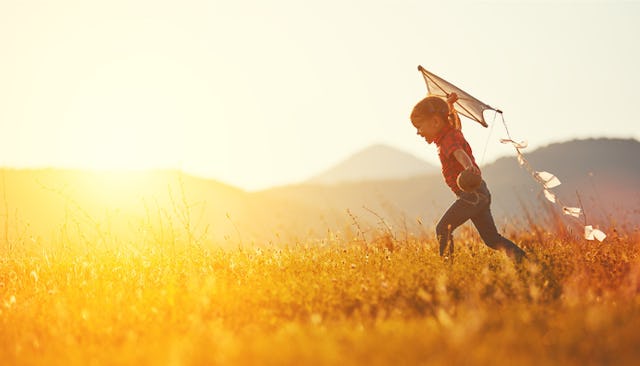'Your Children Are Not Your Children' — Kahlil Gibran Was Right

I first encountered the poem, “On Children” by Kahlil Gibran when I was a teenager. I don’t recall exactly when, but I can hear my dad reciting the words, “Your children are not your children,” and other lines from the poem in wistful tones. Perhaps he was coming to grips with his kids growing up. Perhaps he had just read it and been moved. Whatever the reason, my dad shared these words with me when I was young, and they stuck.
More than 20 years — and three kids of my own — later, I find myself revisiting this poem from the perspective of a mother. My oldest is 16, and the heartbreaking genius of Gibran floors me, especially considering that he never had children of his own.
Ordinarily, I automatically reject parenting opinions from people without kids, but I can’t reject this poem. Perhaps childlessness gave him an objectivity that made it possible to see the truth. If there’s one thing that’s hard to find as a parent, it’s level-headed detachment.
My thoughts as I read “On Children”:
Your children are not your children.
They are the sons and daughters of Life’s longing for itself. They come through you but not from you, And though they are with you yet they belong not to you.
Ouch. Right out of the gate, he hits us where it hurts. That first line evokes a visceral response in most of us parents, who feel a biological, emotional, and spiritual instinct to care for our children. We chose (perhaps) to have them. We are conscientiously raising them, teaching them, loving them. What do you mean they’re not our children?
But, of course, they aren’t. They do not “belong to” us. We don’t own them. We may have chosen (or not) to conceive them, but we didn’t choose who they are. We are the means by which they came into the world, but we did not design them. A force greater than ourselves — God, nature, “Life’s longing for itself,” whatever you want to call it — is responsible for that.
You may give them your love but not your thoughts,
For they have their own thoughts. You may house their bodies but not their souls, For their souls dwell in the house of tomorrow, which you cannot visit, not even in your dreams.
Not only are my kids not mine, but also, let’s think about our own mortality. Ouch, again.
Seriously, though, this is so true. Kids come with their own unique identity, and their own unique part to play in this world. We can’t imagine what potential lies within them, and we certainly can’t imagine what their world will be like in the future.
We can care for them and offer them what we can, but we can’t make them think like us or believe like us. And we shouldn’t want to because they will need different thoughts and beliefs to navigate a world we can’t foresee. They are living in their own time, just as we are. And they were created for their time, not ours.
You may strive to be like them,
but seek not to make them like you. For life goes not backward nor tarries with yesterday.
Parents understand this concept of time better than anybody. There’s no halting time, and there’s certainly no reversing it, no matter how much we might wish to do so. Time marches forward, and we all move forward with it.
It’s so tempting to want to make our mark on — or through — our children, but they have their lives, and we have ours. They have their own destinies to fulfill, and we have ours. Our destinies are interwoven, but they are not the same.
You are the bows from which your children
as living arrows are sent forth. The archer sees the mark upon the path of the infinite, and He bends you with His might that His arrows may go swift and far.
I feel this bending now, as my oldest prepares to make her way out from under my wing. Perhaps this is why parents say parenting doesn’t get easier. The closer we are to sending our children out into the world, the further we have to bend. We get stretched to our limit, and before we know it, they are off. But the bending and stretching are painful. I love this analogy illustrating that this pain has a purpose.
Let your bending in the archer’s hand be for gladness;
For even as He loves the arrow that flies, so He loves also the bow that is stable.
What a lovely reminder to find joy through the pain, because we and our children are loved by the Divine. And to be strong, because our stability will help our children to fly.
Our children. Our children who are unique, individual human beings, with whom we are only together for a spell. Our children who will help move the wheel of humanity a few feet farther than we’ll be able to see. Our children who have their own destiny and their own purpose separate and apart from our own.
Our children who are not really our children at all.
This article was originally published on